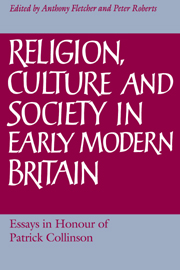Book contents
- Frontmatter
- Contents
- List of illustrations
- List of contributors
- Preface
- List of abbreviations
- Patrick Collinson
- 1 Nicolas Pithou: experience, conscience and history in the French civil wars
- 2 Elizabethan players and minstrels and the legislation of 1572 against retainers and vagabonds
- 3 Cleanliness and godliness in early modern England
- 4 Blood is their argument: men of war and soldiers in Shakespeare and others
- 5 Pragmatic readers: knowledge transactions and scholarly services in late Elizabethan England
- 6 The gardens of Sir Nicholas and Sir Francis Bacon: an enigma resolved and a mind explored
- 7 The Protestant idea of marriage in early modern England
- 8 James VI and I: furnishing the churches in his two kingdoms
- 9 A British patriarchy? Ecclesiastical imperialism under the early Stuarts
- 10 The Anglo-Scottish Union 1603–1643: a success?
- 11 Popery, purity and Providence: deciphering the New England experiment
- 12 Provincial preaching on the eve of the Civil War: some West Riding fast sermons
- 13 Popular form, Puritan content? Two Puritan appropriations of the murder pamphlet from mid-seventeenth-century London
- 14 The two ‘National Churches’ of 1691 and 1829
- Bibliography of the published writings of Patrick Collinson, 1957–1992
- Index
3 - Cleanliness and godliness in early modern England
Published online by Cambridge University Press: 03 December 2009
- Frontmatter
- Contents
- List of illustrations
- List of contributors
- Preface
- List of abbreviations
- Patrick Collinson
- 1 Nicolas Pithou: experience, conscience and history in the French civil wars
- 2 Elizabethan players and minstrels and the legislation of 1572 against retainers and vagabonds
- 3 Cleanliness and godliness in early modern England
- 4 Blood is their argument: men of war and soldiers in Shakespeare and others
- 5 Pragmatic readers: knowledge transactions and scholarly services in late Elizabethan England
- 6 The gardens of Sir Nicholas and Sir Francis Bacon: an enigma resolved and a mind explored
- 7 The Protestant idea of marriage in early modern England
- 8 James VI and I: furnishing the churches in his two kingdoms
- 9 A British patriarchy? Ecclesiastical imperialism under the early Stuarts
- 10 The Anglo-Scottish Union 1603–1643: a success?
- 11 Popery, purity and Providence: deciphering the New England experiment
- 12 Provincial preaching on the eve of the Civil War: some West Riding fast sermons
- 13 Popular form, Puritan content? Two Puritan appropriations of the murder pamphlet from mid-seventeenth-century London
- 14 The two ‘National Churches’ of 1691 and 1829
- Bibliography of the published writings of Patrick Collinson, 1957–1992
- Index
Summary
Wee can suffer no uncleannesse in our bodies, but incontinent we wash it away, neither can abide it in our garments, but without delay, we remedie it: yea, the smallest uncleannesse in the vessells that serve us for meate and drinke makes our very food loathsome unto us.
The Workes of Mr. William Cowper (1529), 732.Dear Johnny, … Keep thy hands and clothes clean; think of what I have sometimes said to thee, All cleanly people are not good, but there are few good people but are cleanly … Our bodies are the Temple of the Holy Ghost, therefore due honour is to be given to them … I would have thee always wear gloves, but [i.e. except] when it is not convenient.
Elizabeth Walker, wife of the rector of Fyfield, Essex, to her grandson, 1689; [Anthony Walker], The Holy Life of Mrs Elizabeth Walker (1690), 291–2.This world is all over dirty. Everywhere it is covered with that which tends to defile the feet of the traveller. Our streets are dirty and muddy, intimating that the world is full of that which tends to defile the soul, that worldly objects and worldly concerns and worldly company tend to pollute us … We can't go about the world but our feet will grow dirty. So in whatever sort of worldly business men do with their hands, their hands will grow dirty and will need washing from time to time, which is to represent the fulness of the world of pollution.
Jonathan Edwards, Images or Shadows of Divine Things, ed. Perry Miller (New Haven, 1948), 94, 128–9.- Type
- Chapter
- Information
- Religion, Culture and Society in Early Modern BritainEssays in Honour of Patrick Collinson, pp. 56 - 83Publisher: Cambridge University PressPrint publication year: 1994
- 9
- Cited by



